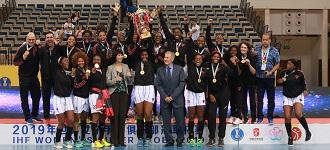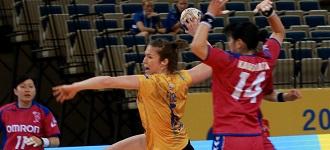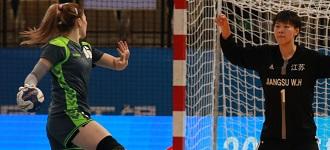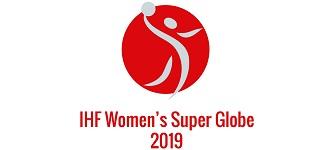1st Women’s Super Globe: A huge step forward for self-funded, volunteer-run UQ
04 Aug. 2019

The 1st IHF Women’s Super Globe represents a great opportunity for women’s clubs from five different confederations to experience international competition against other teams from around the world – but for some, that experience is perhaps more valuable than for others.
Australia’s University of Queensland is a club run entirely by volunteers, which operates in the city of Brisbane, where regular competition is difficult to come by. As such, the matches in Wuxi are very important for the team – which includes several national team players in both indoor and beach handball – to gain more experience at a high-level competition.
“I would say it’s a massive privilege. It’s fantastic to be invited, to be able to qualify through the Oceania club champs,” says UQ goalkeeper Jemima Harbort, who ranked as the number one goalkeeper in terms of number of saves at the Women’s Super Globe ahead of the final day of competition, and looks to be in a strong position to finish in first place on this list. “For the last five, six years, we’ve been building towards these kind of competitions.
“For us in particular the games have been extremely strong. The first game against the Brazilian club team – completely different for us,” says Harbort. “Then again, against Jiangsu, it was very much the Chinese/Asian style of handball. I feel like the competition is fairly strong. Obviously at the moment there are no European teams here, but hopefully in the future that’s only going to bolster the competition. It’s a great level of play I think.”
A self-funded club run entirely by volunteers
For some the concept of a club, let alone a federation, run entirely by volunteers might be a difficult concept to grasp. At UQ, every single aspect is taken care of by people, mostly players, who dedicate their free time to ensuring the club keeps moving forward – from coaching each to social media, from seeking sponsorship opportunities to financial planning. The latter aspect is one Harbort herself takes care of, as an accountant in her professional career. The team are also entirely self-funded.
“[They are] all volunteers. A lot of them are players – we’ve got some of them here,” says Harbort, listing the different responsibilities undertaken by the management on site, several of whom are also players in the men’s UQ team which were defeated by Sydney University Handball Club in the Oceania championship final by just one goal in extra time earlier in the year. “Being able to help get our teams to things like this is a next step for us.”
“We need to build everything back up again”
The club handball competition in Brisbane has followed something of a rollercoaster ride over the last 20 years. After the 2000 Olympic Games in Sydney, interest in handball grew and the club competitions thrived, but the fact that participation is self-funded and often requires more dedication than ‘only’ being a player took its toll and different clubs have risen and fallen since then. With that, the number of competitive matches has decreased.
“It’s pretty tough at the moment. We are obviously the biggest club. There are not many clubs at the moment. We’ve got Brisbane Handball Club. Griffith University still have a team, but we don’t get as many games,” says Harbort. “Our next goal is having those three, four clubs, and then getting those competitive games at least once a week – it has to be.
“At the moment we play intra-club games. Within our club, we have several teams, so we play a lot of these intra-club games. I play a lot with the men, which benefits me, but they also need competitive games so they’re progressing and getting better. So that’s the goal. It’s pretty tough at the moment, but we do have a forward plan.
“Apart from player retention and getting more teams, it’s also helping Queensland Handball promote getting another club, whether that be us supporting them – we really need to foster that, cause we understand that that’s really important. We need to build everything back up again.”
In recent years, UQ has become clearly the most important club in Brisbane, Australia’s third largest city. The volunteers at UQ have dedicated significant effort to the club’s growth, including an increased social media presence and securing of sponsors.
“The goal with things like this is that we sit down, setting out our parameters of what we want to do. The boys set out basically how many followers they want [on social media] within that sort of span. Obviously social media is a great way to break through that gap. But I more or less leave that to them – social media is not my space!” says Harbort. “When I come in, as a qualified accountant, it’s more from the aspect of what I think we can do and what I think is reaching too far.”
UQ well represented at 2019 IHF Men’s Junior World Championship
UQ are highly motivated to continue growing as a club and, by extension, helping the handball competition in Brisbane to continue to develop. They have outlined certain goals in order to do so.
“One of our big focuses is on player retention. As you can see with our team, we do have a strong base of Australians,” says Harbort, referring to the fact that many clubs in Australia have traditionally been highly populated with international students from abroad, and that it is important for the club’s growth that there are also local players taking part. “It’s also a promotion within our grass roots. What we’re promoting more and more is trying to get those younger students and players coming through our club, and that promotes them looking at the university as well, which is important.”
“There were quite a few players who played at the Junior Men’s World Champs who were UQ players. Not only because it’s a strong club – a few of them are going to university there as well.”
Focus on more competitive matches
The fact that one of UQ’s – and indeed all in Handball Australia – focuses is on more competitive matches clearly demonstrates the importance of the Super Globe participation for the club. The maiden Women’s Super Globe in Wuxi has certainly been a huge step forward for UQ.
“I think one of our biggest issues in Australia is not enough competitive games, and that’s what we’re on a real drive for, because we can train as much as we like, but it’s never going to be as good as experiencing game play,” concludes Harbort.






